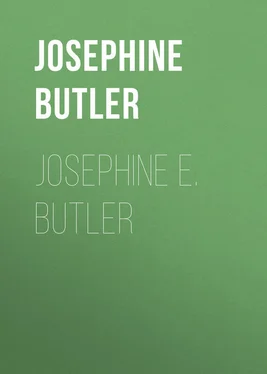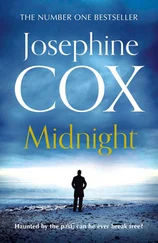Josephine Butler - Josephine E. Butler
Здесь есть возможность читать онлайн «Josephine Butler - Josephine E. Butler» — ознакомительный отрывок электронной книги совершенно бесплатно, а после прочтения отрывка купить полную версию. В некоторых случаях можно слушать аудио, скачать через торрент в формате fb2 и присутствует краткое содержание. Жанр: foreign_antique, foreign_prose, на английском языке. Описание произведения, (предисловие) а так же отзывы посетителей доступны на портале библиотеки ЛибКат.
- Название:Josephine E. Butler
- Автор:
- Жанр:
- Год:неизвестен
- ISBN:нет данных
- Рейтинг книги:5 / 5. Голосов: 1
-
Избранное:Добавить в избранное
- Отзывы:
-
Ваша оценка:
- 100
- 1
- 2
- 3
- 4
- 5
Josephine E. Butler: краткое содержание, описание и аннотация
Предлагаем к чтению аннотацию, описание, краткое содержание или предисловие (зависит от того, что написал сам автор книги «Josephine E. Butler»). Если вы не нашли необходимую информацию о книге — напишите в комментариях, мы постараемся отыскать её.
Josephine E. Butler — читать онлайн ознакомительный отрывок
Ниже представлен текст книги, разбитый по страницам. Система сохранения места последней прочитанной страницы, позволяет с удобством читать онлайн бесплатно книгу «Josephine E. Butler», без необходимости каждый раз заново искать на чём Вы остановились. Поставьте закладку, и сможете в любой момент перейти на страницу, на которой закончили чтение.
Интервал:
Закладка:
Aurelio Saffi was at this time in exile and living in Oxford. He had been associated with Mazzini and Armellini in the Triumvirate which ruled in Rome for a short period, and was parliamentary deputy for his own native town of Forli. He was a cultivated and literary man, with a thorough knowledge of the Italian poets. As an exile his material means were at that time very slender. My husband sought his acquaintance, and invited him to give a series of evening lectures on Dante in our own drawing-room. These were attractive to some, and increased the personal interest felt in Saffi in the university. Twenty-seven years later, having returned to Italy from exile, Saffi was presiding at a great congress in Genoa where we were. He alluded, with much feeling, to the years he had spent in Oxford; and turning to my husband, who was near him, he said: “It is twenty-seven years to-day that, an exile from my native land, I had the happiness of being received in your house at Oxford, and I have never forgotten, and shall never forget, the hospitable and gracious reception given to me by you and your worthy companion. The times are changed; a long interval has elapsed, and it is to me a great joy to-day to greet you once more, and on my native soil.”
But this pleasant life at Oxford had its shadow side. I had come from a large family circle, and from free country life to a university town – a society of celibates, with little or no leaven of family life; for Oxford was not then what it is now under expanded conditions, with its married fellows and tutors, its resident families, its ladies’ colleges, and its mixed, general social life. With the exception of the families of a few heads of houses, who lived much secluded within their college walls, there was little or no home life, and not much freedom of intercourse between the academical portion of the community and others. A one-sidedness of judgment is apt to be fostered by such circumstances – an exaggeration of the purely masculine judgment on some topics, and a conventual mode of looking at things.
In the frequent social gatherings in our drawing-room in the evenings there was much talk, sometimes serious and weighty, sometimes light, interesting, critical, witty and brilliant, ranging over many subjects. It was then that I sat silent, the only woman in the company, and listened, sometimes with a sore heart; for these men would speak of things which I had already revolved deeply in my own mind, things of which I was convinced, which I knew, though I had no dialectics at command with which to defend their truth. A few remarks made on those evenings stand out in my memory. They may seem slight and unimportant, but they had a significance for me, linking themselves, as they did, to long trains of thought which for some years past had been tending to form my own convictions.
A book was published at that time by Mrs. Gaskell, and was much discussed. This led to expressions of judgment which seemed to me false – fatally false. A moral lapse in a woman was spoken of as an immensely worse thing than in a man; there was no comparison to be formed between them. A pure woman, it was reiterated, should be absolutely ignorant of a certain class of evils in the world, albeit those evils bore with murderous cruelty on other women. One young man seriously declared that he would not allow his own mother to read such a book as that under discussion – a book which seemed to me to have a very wholesome tendency, though dealing with a painful subject. Silence was thought to be the great duty of all on such subjects. On one occasion, when I was distressed by a bitter case of wrong inflicted on a very young girl, I ventured to speak to one of the wisest men – so esteemed – in the university, in the hope that he would suggest some means, not of helping her, but of bringing to a sense of his crime the man who had wronged her. The sage, speaking kindly however, sternly advocated silence and inaction. “It could only do harm to open up in any way such a question as this. It was dangerous to arouse a sleeping lion.” I left him in some amazement and discouragement, and for a long time there echoed in my heart the terrible prophetic words of the painter-poet Blake – rude and indelicate as he may have been judged then – whose prophecy has only been averted by a great and painful awakening —
The harlot’s curse, from street to street,
Shall weave old England’s winding-sheet.
Every instinct of womanhood within me was already in revolt against certain accepted theories in society, and I suffered as only God and the faithful companion of my life could ever know. Incidents occurred which brought their contribution to the lessons then sinking into our hearts. A young mother was in Newgate for the murder of her infant, whose father, under cover of the death-like silence prescribed by Oxford philosophers – a silence which is in fact a permanent endorsement of injustice – had perjured himself to her, had forsaken and forgotten her, and fallen back, with no accusing conscience, on his easy, social life, and possibly his academic honours. I wished to go and speak to her in prison of the God who saw the injustice done, and who cared for her. My husband suggested that we should write to the chaplain of Newgate, and ask him to send her to us when her sentence had expired. We wanted a servant, and he thought that she might be able to fill that place. She came to us. I think she was the first of the world of unhappy women of a humble class whom he welcomed to his own home. She was not the last.
A travelling circus came to the neighbourhood. A young woman who performed as an acrobat somehow conveyed to us her longing desire to leave the life in which she was plunged, the most innocent part of which was probably her acrobatic performances. She had aspirations very far beyond what is usually expected from a circus woman. She wanted to serve God. She saw a light before her, she said, and she must follow it. She went secretly to churches and chapels, and then she fled – she did not know where – but was recaptured. It was a Sunday evening in hot summer weather. I had been sitting for some time at my open window to breathe more freely the sultry air, and it seemed to me that I heard a wailing cry somewhere among the trees in the twilight which was deepening into night. It was a woman’s cry – a woman aspiring to heaven and dragged back to hell – and my heart was pierced with pain. I longed to leap from the window, and flee with her to some place of refuge. It passed. I cannot explain the nature of the impression, which remains with me to this day; but beyond that twilight, and even in the midst of the pitiful cry, there seemed to dawn a ray of light and to sound a note not wholly of despair. The light was far off, yet coming near, and the slight summer breeze in those tall trees had in them a whisper of the future. But when the day dawned it seemed to show me again more plainly than ever the great wall of prejudice, built up on a foundation of lies, which surrounded a whole world of sorrows, griefs, injustices and crimes which must not be spoken of – no, not even in whispers – and which it seemed to me then that no human power could ever reach or remedy. And I met again the highly-educated, masculine world in our evening gatherings more than ever resolved to hold my peace – to speak little with men, but much with God. No doubt the experience of those years influenced in some degree my maturer judgment of what is called “ educated public opinion.”
My motive in writing these recollections is to tell what he was – my husband – and to show how, besides all that he was in himself and all the work he did, which was wholly and especially his own, he was of a character to be able from the first to correct the judgment and soothe the spirit of the companion of his life when “the waters had come in even unto her soul.” I wish to show, also, that he was even more to me in later life than a wise and noble supporter and helper in the work which may have been called more especially my own. He had a part in the creation of it, in the formation of the first impulses towards it. Had that work been purely a product of the feminine mind, of a solitary, wounded and revolted heart, it would certainly have lacked some elements essential to its becoming in any way useful or fruitful. But for him I should have been much more perplexed than I was. The idea of justice to women, of equality between the sexes, and of equality of responsibility of all human beings to the moral law, seems to have been instinctive in him. He never needed convincing. He had his convictions already from the first – straight, just and clear. I did not at that time speak much, but whenever I spoke to him the clouds lifted. It may seem a little strange to say so, but, if I recall it truly, what helped me most of all at that time was, not so much any arguments he may have used in favour of an equal standard, but the correctness with which he measured the men and the judgments around him. I think there was even a little element of disdain in his appreciation of the one-sided judgments of some of his male friends. He used to say, “I am sorry for So-and-So,” which sounded to me rather like saying, “I am sorry for Solomon,” my ideas of the wisdom of learned men being, perhaps, a little exaggerated. He would tell me that I ought to pity them. “They know no better, poor fellows.” This was a new light for me, I had thought of Oxford as the home of learning and of intellect. I thought the good and gifted men we daily met must be in some degree authorities on spiritual and moral questions. It had not occurred to me to think of them as “poor fellows!” That blessed gift of common sense, which he possessed in so large a degree, came to the rescue to restore for me the balance of a mind too heavily weighted with sad thoughts of life’s perplexing problems. And then in the evenings, when our friends had gone, we read together the words of Life, and were able to bring many earthly notions and theories to the test of what the Holy One and the Just said and did. Compared with the accepted axioms of the day, and indeed of centuries past, in regard to certain vital questions, the sayings and actions of Jesus were, we confessed to one another, revolutionary. George Butler was not afraid of revolution. In this sense he desired it, and we prayed together that a holy revolution might come about, and that the Kingdom of God might be established on the earth. And I said to myself: “And it is a man who speaks to me thus – an intelligent, a gifted man, a learned man too, few more learned than he, and a man who ever speaks the truth from his heart.” So I was comforted and instructed. It was then that I began to see his portrait given, and I see it still more clearly now as I look back over his whole past life, in the 15th Psalm: “Lord, who shall dwell in Thy tabernacle? Or who shall rest upon Thy holy hill? Even he that leadeth an uncorrupt life, and doeth the thing which is right, and speaketh the truth from his heart. He that hath used no deceit in his tongue, nor done evil to his neighbour, and hath not slandered his neighbour. He that setteth not by himself, but is lowly in his own eyes, and maketh much of them that fear the Lord. He that sweareth unto his neighbour, and disappointeth him not, even though it were to his own hindrance.”
Читать дальшеИнтервал:
Закладка:
Похожие книги на «Josephine E. Butler»
Представляем Вашему вниманию похожие книги на «Josephine E. Butler» списком для выбора. Мы отобрали схожую по названию и смыслу литературу в надежде предоставить читателям больше вариантов отыскать новые, интересные, ещё непрочитанные произведения.
Обсуждение, отзывы о книге «Josephine E. Butler» и просто собственные мнения читателей. Оставьте ваши комментарии, напишите, что Вы думаете о произведении, его смысле или главных героях. Укажите что конкретно понравилось, а что нет, и почему Вы так считаете.












